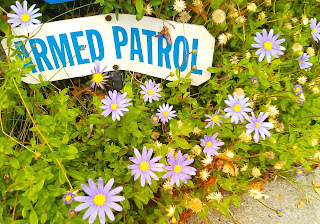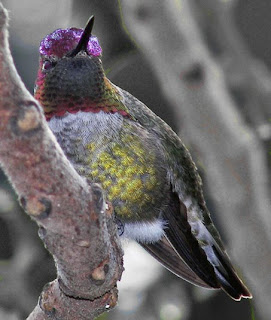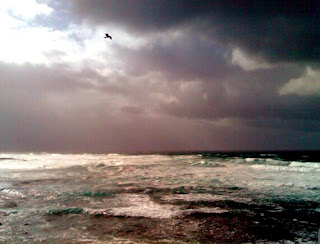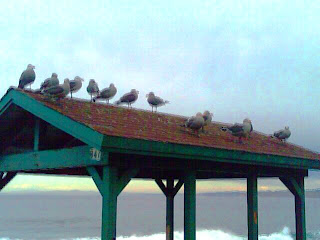I love the swirl and swing of words as they tangle with human emotions – James Mitchener
The Shoebill, Balaeniceps rex, also known as Whalehead, is a very large stork-like bird. It derives its name from its massive shoe-shaped bill.
On the cusp of the New Year, I've included nine years of additions to our vocabulary. What emotions have you experienced as you bumped into these words?
2000 - The Millennium began. Remember when you wondered if the Y2K would disintegrate all your electronic equipment? They deciphered two-thirds of the human genome.
2001 - We will never forget the numerals 9 and 11 in all their formations . What good happened for you this year?
2002 - We would hear on and on about Enron. What else would you do with those letters?
2003 - “Shock and Awe” entered our vocabulary. What's a better usage?
2004 - Abu Ghraib, a prison in Baghdad, provided photographs that made us question. How would you unscramble the letters?
2005 - Star Trek ended after 18 years but would remain in the vocabulary. Laonastidae, the first new family of mammala since 1974 announced. Check it out.
2006- Wii added animation and movement for coach potatoes. Did you play?
2007 - Pixar came out with Ratatouille a cartoon about a rat with culinary talents. Did you write about food?
2008 - November 4, 2008 Barack Obama added to our vocabulary. What's your write?
2009 - I'm leaving this open for suggestions.
Creative Write: As you go through the years, what do these words mean to you? Play with them and add emotions.
Monday, December 28, 2009
Thursday, December 24, 2009
An Armed Patrol of Daisies

'There is no use trying," said Alice, "one can't believe impossible things."
"I dare say you haven't had much practice," said the Queen. "When I was your age I always did it for half an hour a day. Why sometimes I've believed as many as six impossible things before breakfast."
from Alice in Wonderland by Lewis G. Carroll.
Every writer facing the blank screen or white page needs to stretch in that first effort. Fingers reach and tickle the keys or the hand selects a pen to send words across the page. Why wait for a notion to arise? Ideas sprout when we jump right in.
Ellen Gilchrist feels every writer faces two questions when she begins to write: can it be done and can I do it? She believes those questions precede all risk-taking.
I suggest - Why ask those questions at all? They get in the way of the adventure that awaits!
Imagine an Armed Patrol of blue daisies protecting your writing skills, encouraging creativity and word flow. Now, there's nothing to fear. Write in and out of an image that feels perplexing.
If the daisies begin to twirl and whirl off their stems, they will arrange themselves at your writing pad or keyboard. Each settles right in, does a dance or jabbers with a smile and provides whispers and mysteries. Will you follow along?
Creative Write: Consider the photograph above. Write for fifteen minutes about impossible things.
Friday, December 18, 2009
21 Questions
Do you need a map or a nap?
Is today a "dip" day where the energy of wings or fleet feet would help?
To push beyond your ennui, try a list of pairs. Ask a question. See what happens when you pair two items.
Just permit free association to take over and don't judge or edit. Go as fast as you can and let your inspiration take you away. Move until you have hit number 21.
Here's a start:
What do I need -
1 frosting or the cake
2 leaves or stays
3 trinkets or trades
4 bows or whens
5 bravery or a kite
6 milk or pencils
7 magic or mocha
8 salmon or a scream
9 tirades or tennis balls
10 singing or flames
11 doilies or disgrace
12 monkeyshines or darkness
13 fright or sherbert
14 bubbles or incubation
15 spindrift or tin foil
16 honey or pintos
17 radiance or a gum drop
18 clutter or a stun gun
19 meringue or perpetuity
20 bongo drums or a secret
21 yogurt or merriment
Then begin again with another question. Break away from ordinary with the questions also. Try rhyming.
What happens at twilight -
l bluebirds or howling
2 thirst or the worst
3 blood or floods
4 maybes or fleas
5 locks or kiddie blocks
6 freedom or kingdom
7 icicles or tricycles
8 harmony or charm
9 ridicules or barnacles
10 moonsbunnies or funny money
11 highways or one act plays
12 nickles or pickles
13 clay pots or knots
14 crowds or clouds
15 soup or droop
16 arrangements or endangerments
17 puddles or cuddles
18 rice or thrice
19 playmates or paperweights
20 mushrooms or classrooms
21 free will or a duck's bill
Creative Write: Try several questions for your 21 pairs. What does Friday sound like? Then try a freewrite mixing all the words.
Thursday, December 17, 2009
Alphabet View of Collaborative Thinking
Why does it become difficult for individuals with opposing views to share a common understanding?
Do we need to take time away from our ego needs to consider a perspective different from our own?
Often when tempers flare, patience marches out the door.
If you draw a W on a sheet of paper and place it on a table between two people who face each other, it will look different to each person.
One person will see it as an M and argue that position while the person on the opposite side sees it as a W and challenges the other's view. Each view feels reasonable for the person facing the letter.
Before spending energy trying to convince people they're wrong, mentally get up and move around to try to see from the other person's perspective. This view may finally make sense to you if you're at his or her shoulder, even if you don't agree fully. Invite the individual to stand next to you also.
The expression, "walk a mile in my mocassins" never gets another's ear. Compromise does not satisfy anyone, either. If you switch the perspective away from what each person's ego believes, you may discover a third way of viewing the situation.
Consider trying the alphabet way. Collaborative thinking creates a new perspective. Try a sideways view and get an E for energy and excitement and move into exotic.
The next time you discover yourself in a situation with two views in conflict, consider how to turn the situation on its side view that neither of you have considered.
If everyone shares the view from an O
Tries to connect with the power of S
Ah! life would become much less of a mess
Then X negates a question of Y
Connects in friendship with an H and I
Agreement on N goes silly with Z
As perception changes its view in C
Just notice how different all life would B
Creative Write: Consider an issue you have not resolved with someone because of differing views. Write about a new way of turning it around. Explore the alphabet too!
Tuesday, December 15, 2009
Portals to Adventure
A picture
lives by companionship. - Mark Rothko
"There are things known and things unknown and between them, the doors." - Jim Morrison
Time stands still for my writer's mind. I snag a snapshot of attention. Ideas leap in. I become a companion with the frame and wonder where my imagination will extend the image.
What happens beyond the gate?
Words in response to pictures help me reflect and interpret the world and form a relationship with others. Sentences search a world of paradox and mystery. Barriers invite my curiosity as portals to adventure.
Creative Write: Take a walk and capture a collage of portals. Or, use the three above. Do a freewite to investigate their connections. Do stories and poems arise from one side of the entrance to the other?
Sunday, December 13, 2009
Discover a Memory House
Simonides of Ceos. a 6th century Greek poet-philosopher, spoke at a banquet to celebrate Scopas' victory in a chariot race. His oration focused on the Gods, Castor and Pollux instead of the victor. Scopas, in irritation, told Simonides he would only pay half the poet's fee. He should ask his two Gods to pay the rest.
At this point, two men called Simonides out of the room. When he left, the palace collapsed and killed everyone. In amazement and relief, he thanked the Gods for "paying half his fee" and saving his life.
During the search for survivors, they asked Simonides to identify guests because of his exceptional memory. He did this by recalling their positions seated at the banquet table. Later, Simonides expanded upon this ability to remember by designing what he called a "memory theatre."
He created loci (plural of the Latin locus meaning place) in each room of his building. When he walked through the rooms mentally, he associated an item with each room. By forming an image between what he wanted to recall and a feature of the locus, he created a linkage. In retrieval, loci determined the desired memory.
The ability to map items and memories provides a way to discover ideas for poetry. When considering what to write about, I travel back through houses experienced. Then I begin with a freewrite and make sensory connections to my memory home.
Here's a start:
I turn my key in the lock and hear the creak of the front door's opening. The door's strength reminds me of my father's hands who could break an apple in one twist. I scurry up the stairs, feeling the nap of the maroon carpeting between my toes. A scent of candle wax mingles with crackers to turn my head and bring memories of my mother's formal dinners. The Grandfather clock's chimes follow me up to the second floor. My bedroom meets me with fresh ironing smells the sun brings through the curtains and horse sweat from my riding boots. My jacaranda tree blooms in lavender and teases me through the window.
Once I have created a map to connect rooms from the freewrite, I go back in and make additional notations to add thoughts and feelings. Additional freewrites will spur me in a variety of directions. Several poems will results from the connections.
Creative Write: Choose a home you have lived in for memory retrieval. Make a chart of each room and select objects. Then wander through each room and create a line of text that hitchhikes off the items. See where your memory takes you in sights, sound and scents. After the initial freewrite, go in and make additional connections.
Saturday, December 12, 2009
Using Stillness
Imagine a hummingbird as a statue on a branch, its flurry of activity at rest. Identify each color and feather in detail.
Tis the season to feel the rush of chaos everywhere. The frenzy for many appears endless. How would it feel to quiet your day?
Take time to sit and breathe in six breaths, then breathe out six. Continue until you can extend your exhalation to ten.
Consider this time of silence when you slow the breath, feel stillness and relax. Sounds may arise around you but they represent energy when you put yourself into a focused state.
Notice that the space around you opens. Nothing will overwhelm you when you pay attention to the rhythm of your breath. Give this feeling of rest a name as you search for balance. Use the name and revisit its calming effect from time to time each day.
Creative Write: Choose a name for your tranquility and sense of peacefulness. Dialogue with this new friend.
Friday, December 11, 2009
Openings and Curiosities
I just finished Barbara Kingsolver's novel, The Lacuna. Her symbol intrigues throughout the story. The word 'lacuna' encompasses a variety of meanings in the book: a cave, a missing text, a gap, a cenote, even the growth of a writer. The reader's Individual curiosities add to the mix.
Discovering the lacuna imagery within the pages, I became fascinated with these lines:
"Frieda, you always said the most important thing about any person is what you don't know. Likewise, then, the most important part of any story is the missing piece."

As I turned the last page of Barbara Kingsolver's novel, notions of what we don't know and openings stayed with me. I wondered about what I'd missed and what had gone missing.
Moving through the next week, I considered all the openings we need as writers. We write ourselves out of and into holes and spaces.
We learn to break open to our process and discover it's vital to, "Open all your pores and bathe in all the tides of nature," as Henry David Thoreau observed.
How do we also remain open to the changes and transitions in life and avoid the traps? We need to observe nature's ways and watch the unfurling of a rose. The times of twilight intrigue when the sky opens to light and darkens at dusk. The trill of birdsong out of silence awakens us at dawn. What occurs within the fissures where water sneaks and bubbles form?
Our awareness pushes our eyes, ears, noses and taste buds to the next curiosity. Do we dare fall into an opening, like Alice? Will we permit our pens and fingers on keyboards to explore with courage and risk?
When we look for openings, we risk the chance to make mistakes. If closed, we miss opportunities and all the wild and wide open places.
Creative Write: What does it mean to become open and receptive?
Choose a metaphor for how you might express openness. Explore possibilities in freewrites. Consider what represents an opening of awareness: Write about a missing piece.
Thursday, December 10, 2009
View of the Storm
Before the storm, the sea flaunts its multiple personalities as it builds force. During their flights of defiance against the wind, seagulls ripple on the currents like kites. They evade the force as long as possible, wielding magic in the thrust of wings. Pigeons circle in formations catching the drafts. Subtle changes alert the birds' radar to seek shelter before intensity could whip them from the sky.
Pelicans and seagulls find protection on the edges of cliffs as winds broil. Cormorants rise into the branches of pine trees and preen. A winter sea and sky toy with the color wheel and capture a view that defies a camera's eye.
In India, darshan means getting a view. The clouds escape to reveal a panorama of the Himalayas from the foothills. It's said that the Himalayas give up their darshan. They're letting you have their view.
The Pacific ocean has provided a darshan on its day of wonder. It doesn't show itself to you right away. The tease encourages a search for your own words and imagery of discovery.

The sky provides an opening. Where does it lead?
As the storm passes, the sky returns to calm the sea and reflect the blue. Seagulls ready their feathers for flight.
Creative Write: Capture a view of a moment in nature. Discover a new way to view a familiar scene.
Wednesday, December 9, 2009
The Art of Winter

"The creative act is courageous, an ancient gesture, a dynamic exploration of the dark mystery that is human existence." - Adriana Diaz from The Soul of Creativity.
By December in Eugene, winter paints a structure of strength in trees and foliage. Silence snuggles in its morning cloak and pads through the neighborhood. Along the railings of bridges, spider webs sport their graffiti sparkled by frost. Leaves continue to fall and land with a crackle and cackle.


What's the fear of winter beyond the bite of cold air?
We should revel in this time of change that provides an opportunity to delve into the basics. The slower pace stimulates a search inward.
Nature reveals the landscape in an array of bare bones. As auxins drain into the roots, squirrels scamper to store their cache of nuts. Everything moves into its simple form as a gesture for us to follow.
I bundle for a run and search my skeletal soul where ideas percolate and words wrap in layers. Nature's art swirls near me. Creation continues in the silent exhalation of trees sculptured by the season's change .Creativity thrives in the spaces among branches.
I explore what it feels like to get to the basics of my art. There's a need for moments in reverence and joy to celebrate the change a winter outlook provides. How the words of winter entice with their requests for ways to adorn the emptiness. This begins the search for mysteries in enrichment and growth that will blossom by spring.
Creative Write: Become courageous. Get to the basics of your writing as art. Use a winter theme to explore what weighs you down. What will it feel like to remove the excess and rest in silence.?What will listening accomplish? Write about the skeletal beginnings of your art.
Subscribe to:
Posts (Atom)
















